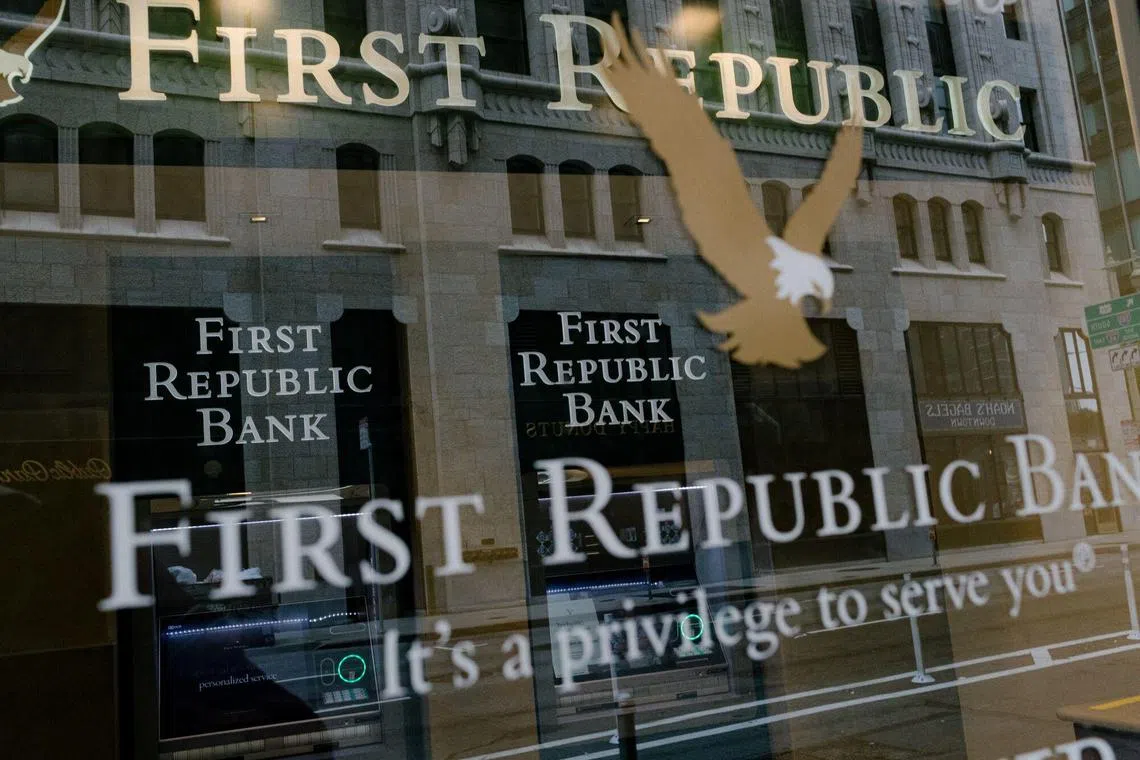US regulators preparing to seize and sell First Republic Bank, say sources
Sign up now: Get ST's newsletters delivered to your inbox

The US regional bank's shares have tumbled 75 per cent since April 24, when it disclosed that customers had withdrawn more than half of its deposits.
PHOTO: BLOOMBERG
New York – United States regulators were racing on Saturday to seize and sell the troubled First Republic Bank before financial markets open on Monday, according to several people with knowledge of the matter, in a bid to put an end to a banking crisis that began in March with the collapse of Silicon Valley Bank (SVB).
The effort, led by the Federal Deposit Insurance Corporation (FDIC), comes after First Republic’s shares had tumbled 75 per cent since April 24, when the bank disclosed that customers had withdrawn more than half of its deposits.
The FDIC has been talking with banks that include JPMorgan Chase, PNC Financial Services and Bank of America about a potential deal, three of the people said. A deal could be announced as soon as Sunday, these people said, cautioning that the situation was rapidly evolving and might still change.
Any buyer would most likely assume the deposits of First Republic, eliminating the need for a government guarantee of deposits in excess of US$250,000 (S$333,000) – the limit for deposit insurance.
It is possible that an agreement will not be reached, in which case the FDIC would need to decide if it would seize First Republic and take ownership itself. In that case, federal officials could invoke a systemic-risk exception to protect those bigger deposits, something they did in March after the failures of SVB and Signature Bank.
The FDIC started sounding out potential buyers late last week as it became clear that there were few options outside a government takeover, one of the people said. The FDIC asked potential bidders to submit binding offers by Sunday, this person said.
Regulations preclude JPMorgan Chase and Bank of America from acquiring another deposit-taking bank because of their size, and regulators would have to grant an exemption if one of those banks were to acquire First Republic.
JPMorgan Chase, PNC and Bank of America were part of a consortium of 11 large banks that temporarily deposited US$30 billion into First Republic in March as part of an industry effort to prop up the bank.
Stunning fall
First Republic was founded in 1985 by James “Jim” Herbert, the son of a community banker in Ohio.
Merrill Lynch acquired the bank in 2007, but it was listed on the stock market again in 2010 after being sold by Merrill’s new owner, Bank of America Corp, following the 2008 financial crisis.
For years, First Republic lured high-net-worth customers with preferential rates on mortgages and loans. This strategy made it more vulnerable than regional lenders with less-affluent customers. The bank had a high level of uninsured deposits, amounting to 68 per cent of deposits.
The San Francisco-based lender saw more than US$100 billion in deposits fleeing in the first quarter, leaving it scrambling to raise money.
Despite the US$30 billion lifeline, the efforts proved futile, in part because buyers baulked at the prospect of having to realise large losses on its loan book.
By last Friday, First Republic’s market value had hit a low of US$557 million, down from its peak of US$40 billion in November 2021.
Shares of some other regional banks also fell on Friday, as it became clear that First Republic was headed for an FDIC receivership, with PacWest Bancorp down 2 per cent after the bell and Western Alliance down 0.7 per cent.
NYTIMES, REUTERS


